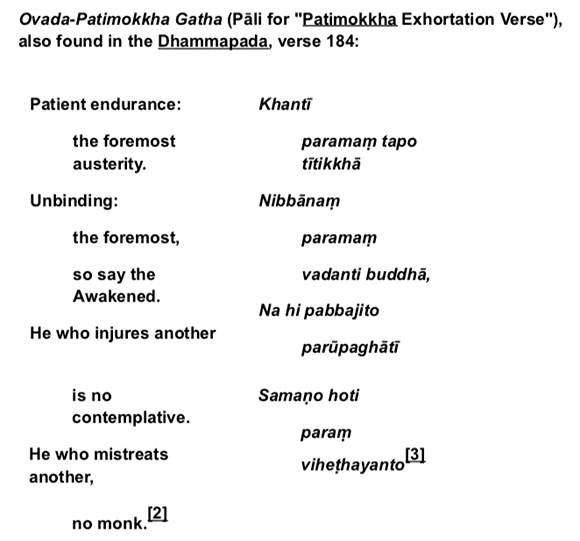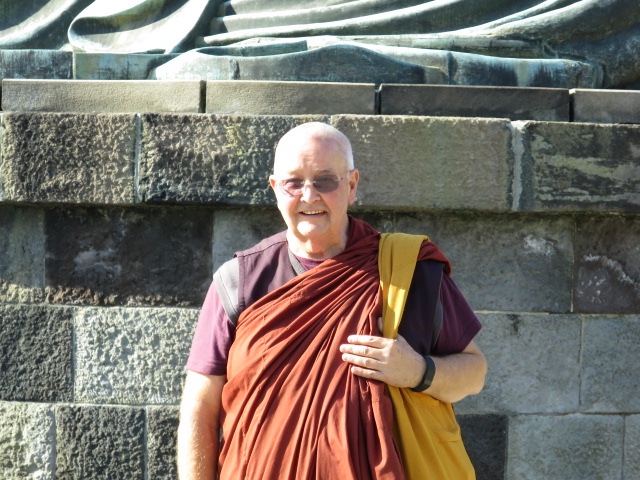Recently I have been giving much thought to the subject of Patience or Khanti and its importance and place in our lives. The Buddha gives it an important place in his teaching and yet we find ourselves living in an age of instant satisfaction, instant answers, instant gratification. This has been assisted by the agency of the internet and all that goes with it.
Even the need to remember or recall simple things such as telephone numbers has been replaced by our mobile phones and their “memory”. Research for many students is now via Google which is often not very accurate and certainly does not demand very much mental effort on our part. Perhaps a certain amount of laziness underlies our “need for speed”. Patience on the other hand requires that we ‘attend’ to what is happening and that we ‘allow’ things to unfold or develop in accordance with their nature. The absolute importance of patience has been appreciated by the wise over many, many centuries. The following passage from Marcus Aurelius written in about 170 AD could also have been spoken by the Buddha himself.
That which rules within, when it is according to nature, is so affected with respect to the events which happen, that it always easily adapts itself to that which is and is presented to it. For it requires no definite material, but it moves towards its purpose, under certain conditions; however, and it makes a material for itself out of that which opposes it, as fire lays hold of what falls into it, by which a small light would have been extinguished: but when the fire is strong, it soon appropriates to itself the matter which is heaped on it, and consumes and rises higher by means of this very material.
Let no act be done without a purpose, nor otherwise than according to the perfect principles of art.
Men seek retreats for themselves, houses in the country, seashores, and mountains; and thou too art wont to desire such things very much. But this is altogether a mark of the most common sort of men, for it is in thy power whenever thou shalt choose to retire into thyself. For nowhere either with more quiet or more freedom from trouble does a man retire than into his own soul, particularly when he has within him such thoughts that by looking into them he is immediately in perfect tranquility; and I affirm that tranquility is nothing else than the good ordering of the mind. Constantly then give to thyself this retreat, and renew thyself.
Meditations Book IV
The Buddha living many centuries earlier praised the virtue of patience thus:

The beautiful Jataka Tale of Khantipada illustrates the wonder and importance of Patience and how we might draw strength from the example of Khantipada who undergoes the most extreme and brutal suffering yet never surrenders his patience and is rewarded by being re-assembled after his ordeal. If you don’t know his story, then go and exercise your own patience by searching for it.
Developing patience leads us on to develop other of the Paramis but especially Equanimity. “Equanimity arises when we accept the way things are.” ~ Jack Kornfield
Patiently sustaining our attention on what is arising is at the very heart of our mediation so there for we should realise that in practising meditation we are also practicing and developing patience for ourselves and others. As Pema Choodron wrote:
Patience is an enormously wonderful and supportive, and even magical practice. It’s a way of completely changing the fundamental human habit of trying to resolve things by going either to the right or the left, calling things right or calling things wrong. It’s the way to develop courage; the way to find out what life is really about. . . . Once when I was stuck with something huge, [my teacher] Trungpa Rinpoche gave me some advice. He said, ‘It’s too big; you can’t let go of it yet, so practice with the little ones. Just start noticing all the little ways you hold when it’s actually pretty easy and just get the hang of letting go.’ This is the most honest and helpful advice that I’ve found on the subject and I hope that it helps you too.
In seeing the places that I can’t yet let go, I’m invited to practice patience, acceptance, and honesty. What are the things that you hold on to? Do you ever find yourself falling into false khanti? How do you get out of it? How does acceptance show up in your life? Don’t be too quick to find an answer. Be patient, and the answers will present themselves.
Do yourself a favour: slow down and really try to stay with what is happening in this very moment. Real patience is not painful but rather opens up our awareness and our hearts so that we might be free in every circumstance in which we find ourselves.
With metta, Bhante Teja

